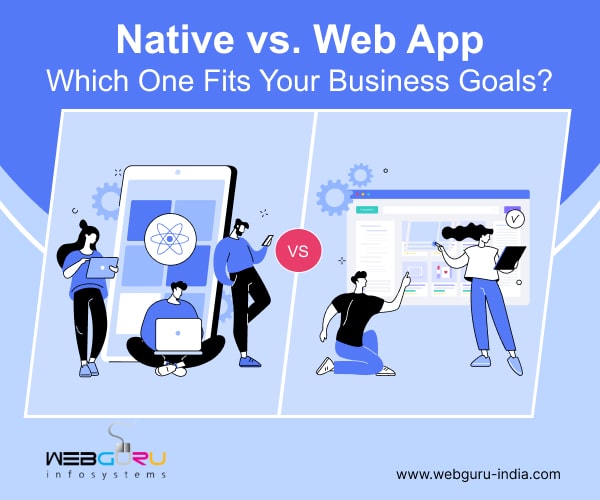Home Blog Web Application Development Native vs. Web App: Choosing the Right Path for Your Business
Native vs. Web App: Choosing the Right Path for Your Business
- 30 Apr / 2024
- 1,706 views
- 8 Min Read

The current digital landscape requires businesses to have a strong online presence, regardless of size. One dilemma that business owners face is whether to create a native application, a web-based application, or both. Each type comes with distinctive benefits and supports your business’s growth. However, exploring the key differences between native and web applications and considering their advantages and disadvantages can help you decide whether you should hire a web application development company or go for native app development services.
Understanding Native App and Web App Development
Native App Development
Creating native apps entails developing applications tailored for a specific operating system, such as iOS or Android. These apps utilise the capabilities and characteristics embedded within those systems, yielding a seamless and superior user experience.
• The use of native applications grants complete accessibility to a device’s hardware and software, facilitating various capabilities such as offline functionality, intricate animations, and seamless incorporation with prominent features like cameras and GPS.
• Native apps typically exhibit a refined appearance and impression, upholding the design principles specific to each platform.
• Creating individualised mobile applications for both iOS and Android can be a laborious and costly endeavor. This is where the assistance of React Native development services proves invaluable. By utilising React, a sought-after web development library, and JavaScript, this framework enables developers to construct distinctly native applications for both platforms using only one codebase. This significantly reduces development time and cost while maintaining the benefits of native apps.
• Although React Native presents benefits, it is crucial to take into account that certain intricate functionalities may demand coding specific to each platform. Ultimately, creating native apps remains a potent strategy for constructing multifaceted and exceptionally efficient mobile applications.
Web App Development
Developing web applications involves creating software programs that can be accessed through a web browser on any device with an internet connection. In contrast to native apps, web apps do not necessitate separate installations, resulting in their widespread accessibility and lack of platform dependency. There are more than 5.3 billion internet users worldwide, which means there is a huge need for web apps. Businesses now have a great chance to connect with customers throughout the world.
• Web applications can span the spectrum from uncomplicated, fixed websites to intricate and engaging programs. They provide numerous benefits, including:
• Utilising a singular code base can cater to all users, substantially decreasing the time and expenses involved in development when compared to constructing native applications.
• Web apps can easily handle a large number of users without compromising performance.
• Maintenance procedures entail the simple implementation of updates on the server, effortlessly disseminated to all users without necessitating individual downloads.
• Web applications may possess limitations when compared to native applications. They commonly depend on an internet connection and could potentially have limited access to device functionalities such as GPS or the camera.
• Despite its limitations, web app development remains a formidable tool for designing and implementing user-friendly and accessible applications. The ever-evolving landscape of web technologies has enabled these apps to bridge the gap with native app capabilities, rendering them an alluring option for a multitude of applications.
Factors Business Owners Should Consider
When it comes to deciding between a native app and a web app, business owners need to take several factors into account, such as:
User Experience
Native Applications: It is common for native applications to give a smoother and quicker user experience as they are made for particular platforms, taking full advantage of device features. They can offer more advanced UI interactions, like gestures and animations, too. In terms of user engagement, native apps outperform web apps. Statistics reveal that 21% of Millennials open an app more than 50 times a day, which suggests high levels of app user loyalty.
Web Apps: Even though web apps have improved UX a lot, they could still not give the same performance and responsiveness as native apps, particularly for complicated functionalities or graphical-heavy applications.
Development Time and Cost
Native Apps: Developing native apps means creating separate codebases for each platform, such as iOS and Android. This might lead to longer development periods and higher costs, but it could also result in better performance with access to features specific only to that platform. For certain businesses, this could make the investment worthwhile.
Web Apps: Building a web app is usually faster and less expensive, as it needs only one codebase that can work on many platforms. This may result in big savings for new businesses or small firms with less budget to spend on development costs.
Distribution and Accessibility
Native Apps: To reach a wide range of users, you can distribute native apps through app stores (like the Apple App Store or Google Play Store). However, it might not be easy to get approval on these platforms, and updating apps could face delays due to review processes.
Web Apps: Web apps can be accessed immediately through a URL and don’t need to be installed from an app store. This makes them simpler to distribute and refresh, with modifications appearing directly for users. Also, web apps are not controlled by the guidelines and restrictions of the app store.
Offline Functionality
Native Apps: Native apps might allow full offline use, permitting users to access particular features and content without requiring an internet connection. It has become possible due to local data storage and caching mechanisms.
Web Apps: Modern web technologies allow for offline capabilities by using methods such as service workers and local storage. Making web apps work fully offline can be more difficult than with native apps.
Maintenance and Updates
Native Apps: Keeping up with native apps means handling various codebases and launching distinct updates for every platform. This might result in increased maintenance costs and longer release cycles.
Web Apps: Web apps have the benefit of centralising maintenance and updates, as changes can be applied to the server-side code, with updates appearing immediately for all users. This makes maintenance easier and ensures a uniform user experience on various platforms.
Making the Decision
So, what’s best for your business? It depends on the needs you have, how much money you can spend, and who your main target audience is. Take a look at these scenarios where each option might be more fitting:
Choose a Native App If:
• You require access to advanced device features like GPS, a camera, or push notifications.
• Performance and responsiveness are critical for your application.
• You are targeting a specific platform or demographic, with a preference for native experiences.
Choose a Web App If:
• You require cross-platform compatibility and want to make your app accessible on a wide range of devices.
• Rapid development and cost-effectiveness are your concerns.
• You value instant updates, flexibility, and distribution without depending on app stores.
Conclusion
Determining whether to construct a native or web app is an essential strategic decision, considering business objectives, target audiences, and resource limitations. Native apps offer superior functionality and access to distinctive device features but are outweighed by the flexibility, accessibility, and cost-effectiveness of web apps. An efficient web application development company can help you weigh the pros and cons of each approach to identify the solution that best aligns with your specific needs. The optimal selection ultimately depends on enterprise objectives and resource constraints. By considering the advantages and disadvantages of each choice, one can reach an enlightened conclusion aligned with their aspirations and goals.

Sujata Bhattacharjee
Sujata Bhattacharjee is a versatile content writer with a passion for crafting engaging narratives. Her work blends creativity with expertise, captivating readers across diverse topics effortlessly.
1 comment
Leave a Reply

-
1000+
Happy
Clients -
25+
Countries
Served -
19+
Years of
Trust








Good article!